A head massage is a deep style massage that focuses on the head, neck and shoulders. A head massage applies a range of techniques to help reduce stress and release tension in the upper body. Massaging the scalp can help stimulate nerves and blood vessels around the area and begin to calm muscle tension around the head. A head massage can be both relaxing and an invigorating experience. Massage therapists working at Physio.co.uk use head massage to treat stress, muscle tension and pain.
What techniques are used in a head massage?
There are many massage techniques used in a head massage. The most common techniques used in a head massage include:
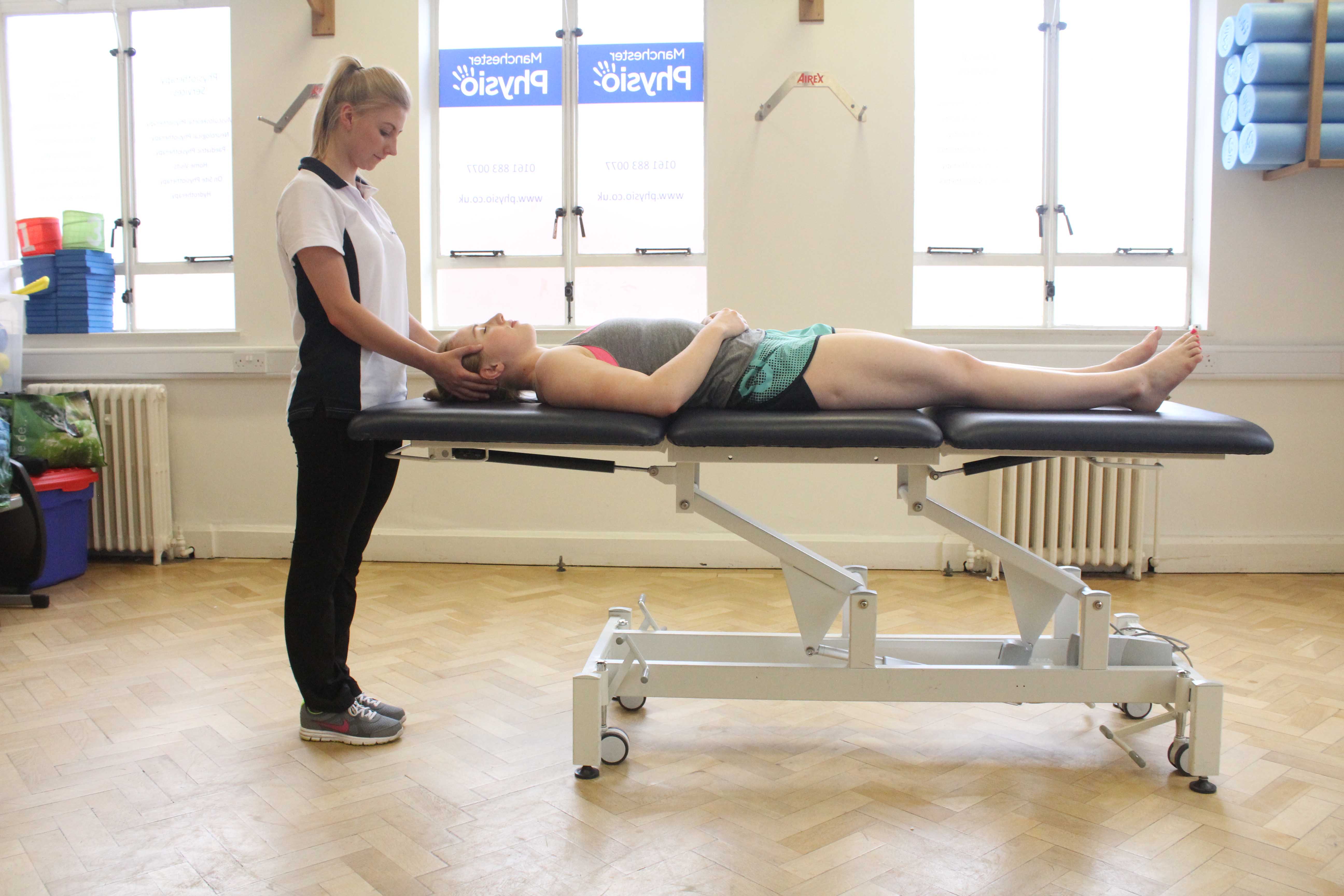 Above: Therapist applying head massage
Above: Therapist applying head massageMany types of massage strokes are used during a head massage. Strokes are performed with flat fingers and hands and can vary from light to firm pressure. Using different types of strokes on the scalp, neck and shoulders are known to be an effective stress reliever and effective in providing relief from acute and chronic headaches.
Kneading is a common massage technique used during a head massage. Kneading is applied onto the neck and shoulders where there is muscle tissue. Kneading is a slow rhythmic massage technique that squeezes and pulls tissue. Kneading involves compressing soft tissues, improving deeper blood and lymph circulation. Stimulating the lymph circulation is important to remove waste products out of the tissues and maintain healthy muscles.
Circular frictions are applied using finger tips or thumbs. During a head massage circular frictions can be used on the scalp and neck. Pressure and depth of frictions can be adjusted dependent on the desired outcome. Circular frictions are repeated over the same area to help relieve tightness in the tissues and increase circulation.
Acupressure is used often in a head massage. Acupressure is a specific technique where fingertip or thumb pressure is applied on to pressure points or trigger points within the soft tissues. Pressure points help to dissolve knots, relax muscles and encourage blood circulation around the body. Pressure points are used around the shoulder, head and face to release common areas of tension. Acupressure is effectively used to decrease headaches.
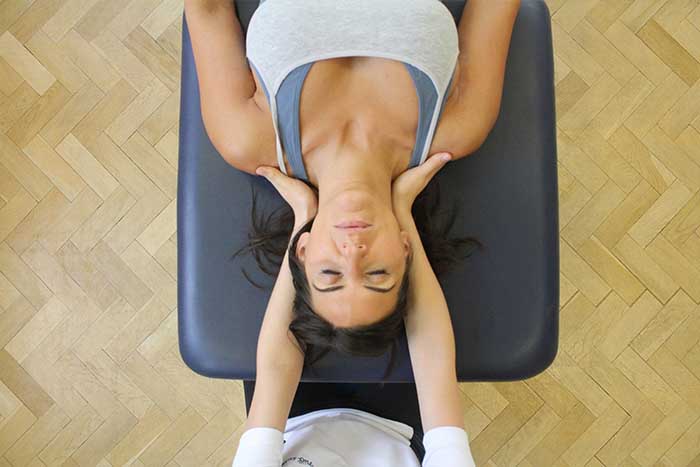
When can a head massage help?
A head massage can help on many occasions. A head massage can help on the following occasions:
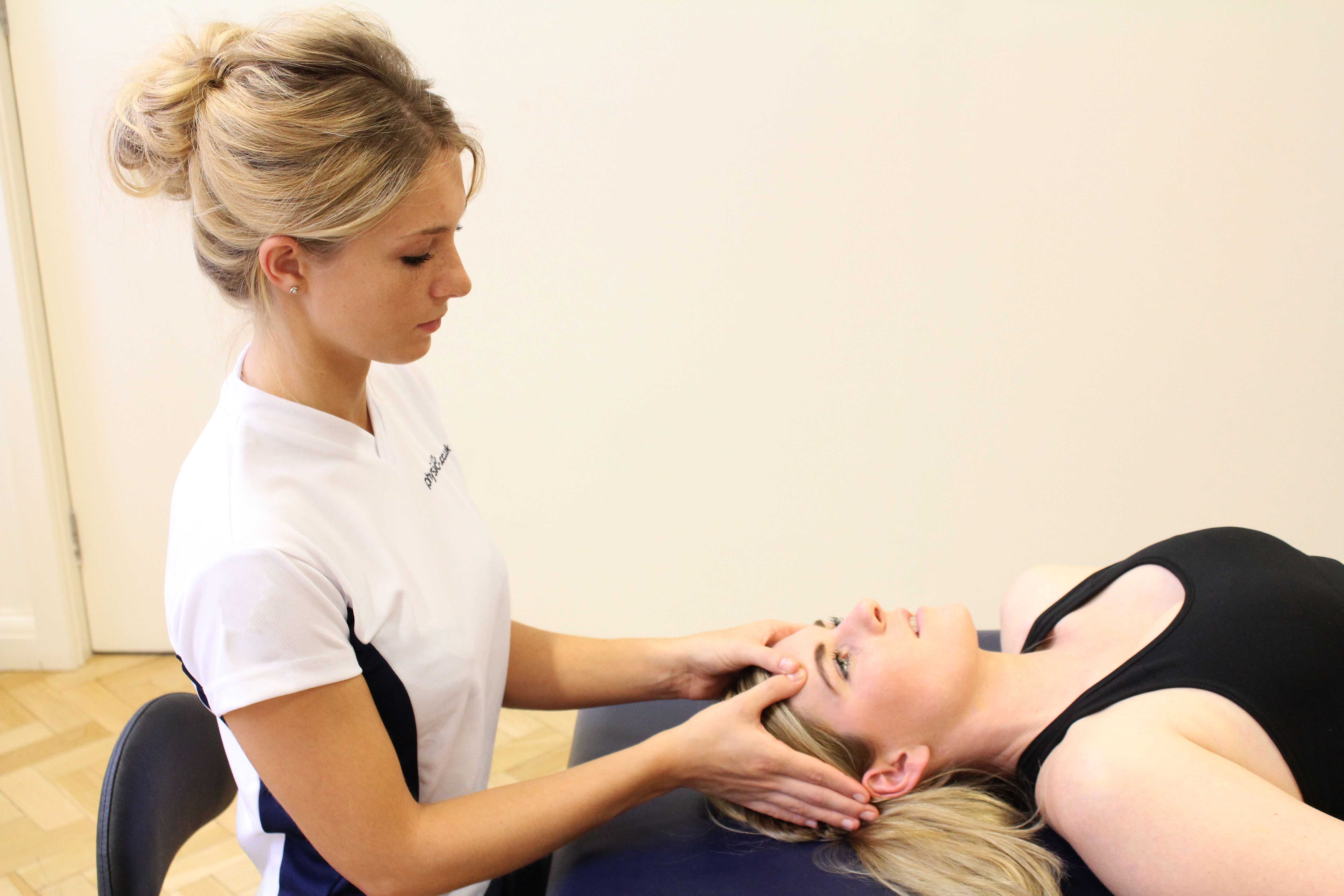 Above: Therapist applying head massage
Above: Therapist applying head massageA head massage is useful to help relieve tight muscles. Tight muscles in the neck and shoulders can occur for many reasons. The most common reasons for tightness in the upper body are due to posture, injury or overuse. Tight muscles around the head increase head and neck pain causing tension headaches. By massaging into the tight muscles around the head can often relieve the muscle spasms that produce pain.
Head massages are also used to help decrease stress. Some forms of stress are helpful in life. However, when stress levels increase the body begins to suffer both physically and mentally. The physical signs of stress are heart palpitations, sweat, tension in muscles and headaches. There are also mental signs of stress which include anxiety, depression, fatigue and tension.
Head massages relieve stress by promoting relaxation and decreasing stress hormones called cortisol. When a person has high levels of cortisol in their body, they become stressed and not relaxed. A head massage reduces the levels of cortisol in the body enabling a person to relax therefore reducing stress.
A head massage helps relieve acute pains such as headaches, muscular ache and fatigue. A head massage can treat into specific areas of pain and relieve tightness. Neck pain can commonly lead to headaches. Tense muscles compress against blood vessels and nerves around the head and neck causing pain. Massaging increases temperature of muscles and helps increase blood circulation into the muscles. Soft tissues around the head and neck relax and relieve pressure.
A head massage can help post-surgery. After receiving surgery around the neck and shoulder areas, muscles can become tight and stiff. A head massage can help treat scar tissue and increase flexibility in the soft tissues. Pain and stress can also be associated to post surgery. A head massage can focus on decreasing pain and relieving emotions of stress. A head massage can be used as an effective stress reliever after surgery or injury.

What are the benefits of a head massage?
A head massage has many benefits. The benefits of a head massage include:
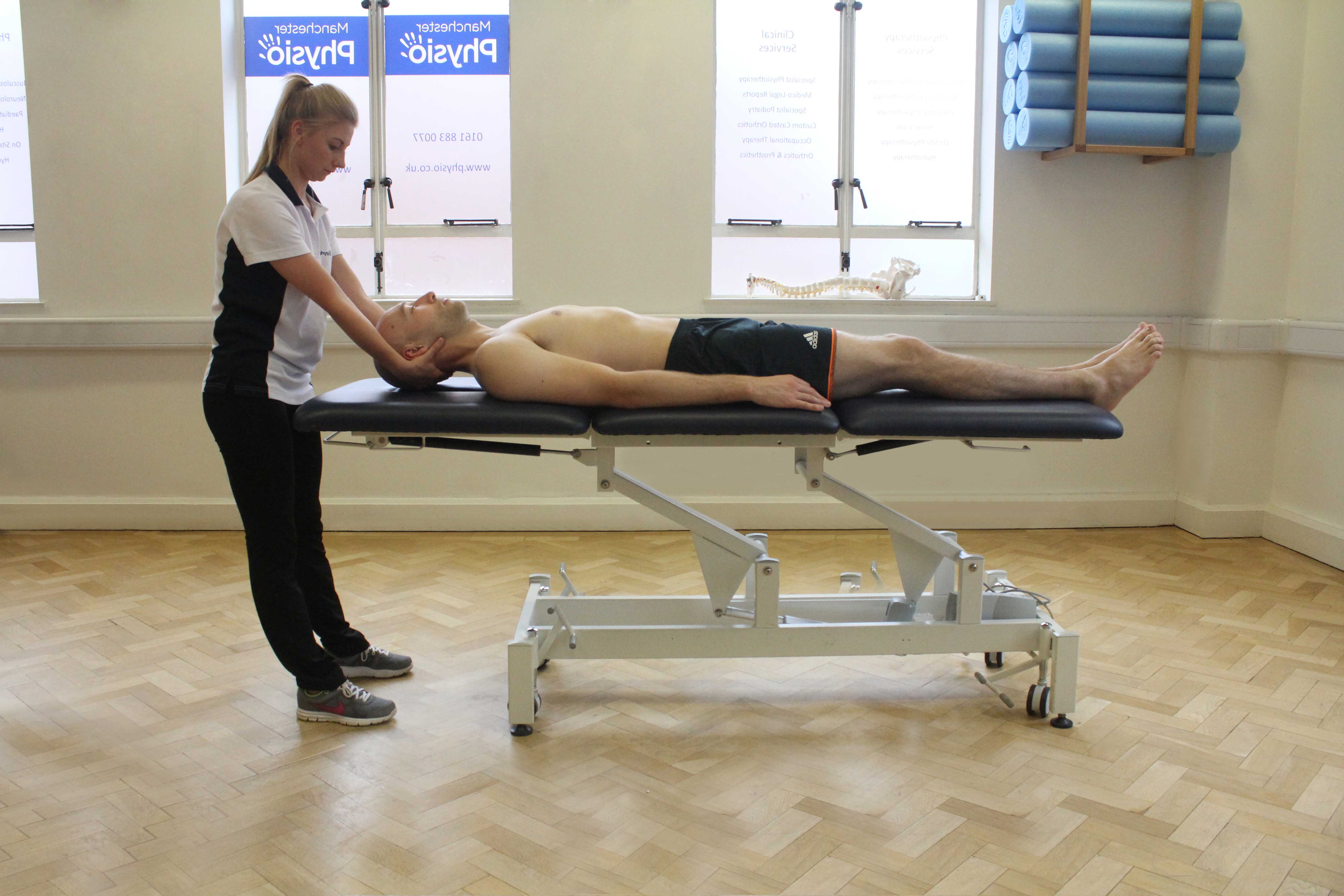 Above: Soft tissue massage of the head
Above: Soft tissue massage of the headA head massage is beneficial for relieving stress. Stress is an emotional and physical strain when we are faced with certain situations. A head massage helps relieve stress by reducing heart rate, decreasing the release of stress hormones and relieving tension in the body. A head massage creates a therapeutic effect on the body, reducing heart rate and blood pressure. A head massage also stimulates the release of feel good hormones and decreases the number of stress hormones released from the brain. Feel good hormones such as endorphins, serotonin and dopamine override stress hormones and replace bad emotions with positive.
A head massage can help decrease pain. The neck, head and shoulders can often become tense and hard causing headaches and muscle soreness. A head massage aims to release any tension by manipulating muscles through certain massage techniques. Emotional stress can also begin to produce aches and pains in the body. A head massage promotes blood circulation and increased levels of oxygen in the blood to relieve stiffness and soreness in the muscles.
A head massage can help improve circulation to the head and face. Improved circulation brings nutrients and oxygen to the head and neck area, improving brain function and increasing the removal of toxins. Enhancing the delivery of nutrients encourages healing throughout the body and promotes better health.
A head massage also encourages a feeling of relaxation. The massage treatment can be carried out across the shoulders, upper arms, head and face. By massaging around these body parts, it energises a general relaxation feel. When the body and mind relaxes energies in the body become rebalanced, improving mood and mental state. When the body relaxes muscles are also encouraged to relax allowing tension to be decreased. After a head massage an increased feeling of peace, calmness and relaxation are achieved.
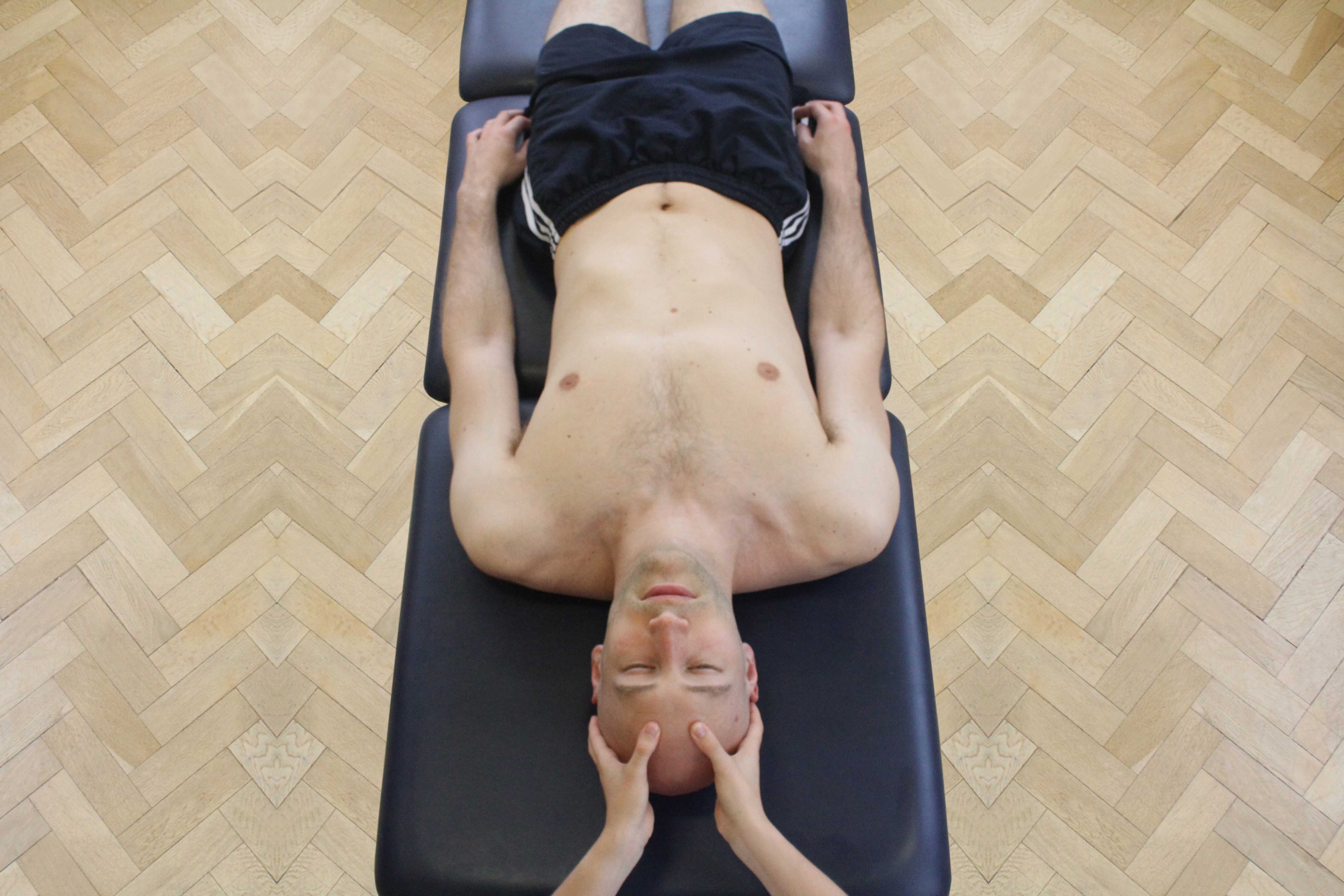 Above: Soft tissue massage of the head
Above: Soft tissue massage of the headSummary
A head massage is also known as an Indian head massage which focuses on the head, neck and shoulders. Massage techniques such as strokes, kneading, frictions and acupressure are used during a head massage to help increase the energy flow through the body, increase blood circulation and relieve knots. A head massage is an effective technique to use for tight muscles, stress, acute pain and post-surgery. There are many benefits when receiving a head massage. The benefits of a head massage are decreased stress, decreased pain, improved circulation and relaxation. Massage therapists working at Physio.co.uk use head massage to treat stress, muscle tension and pain.
How can I arrange a head massage?
The easiest way to arrange a head massage at Physio.co.uk is to email us at office@physio.co.uk or call us on 0800 033 7800.
Alternatively if you have any questions please feel free to contact us.
We offer a 7 day service and provide home and clinic appointments.

 0330 088 7800
0330 088 7800






































